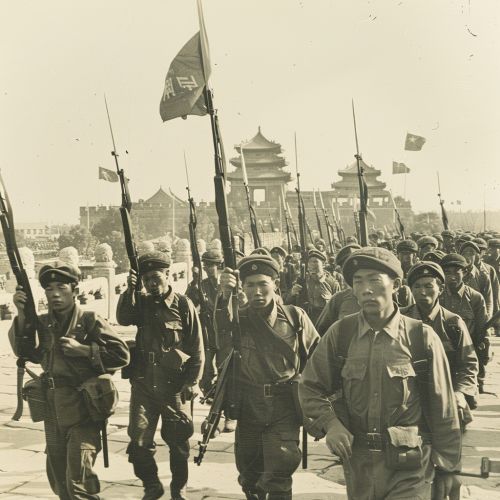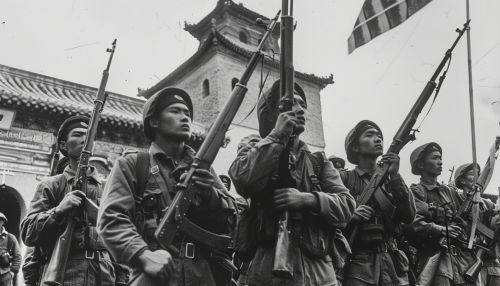Wuchang Uprising
Background
The Wuchang Uprising, which occurred on October 10, 1911, was a significant event in Chinese history that marked the beginning of the Xinhai Revolution. This revolution ultimately led to the fall of the Qing Dynasty and the establishment of the Republic of China. The uprising took place in Wuchang, which is now part of Wuhan, the capital of Hubei Province. The Wuchang Uprising was the result of a combination of political, social, and economic factors that had been brewing for decades.
Causes
Political Factors
The Qing Dynasty, which had ruled China since 1644, was facing increasing internal and external pressures in the late 19th and early 20th centuries. Internally, the dynasty was plagued by corruption, inefficiency, and a lack of modernization. The Boxer Rebellion of 1899-1901 further weakened the Qing government and exposed its inability to defend Chinese sovereignty against foreign powers. Additionally, the Qing government's attempts to implement reforms, such as the New Policies of 1901-1911, were seen as too little, too late by many Chinese intellectuals and revolutionaries.
Social Factors
Socially, China was undergoing significant changes. The spread of Western education and ideas, particularly among the urban elite, led to the rise of a new class of intellectuals who were critical of the Qing Dynasty and its inability to modernize China. These intellectuals were influenced by Western political ideologies, such as republicanism and nationalism, and sought to create a modern, democratic China.
Economic Factors
Economically, China was suffering from the effects of foreign imperialism and internal strife. The treaty ports established by Western powers and Japan had eroded China's economic sovereignty, leading to widespread poverty and discontent among the Chinese population. Additionally, the Qing government's heavy taxation and financial mismanagement exacerbated the economic hardships faced by ordinary Chinese citizens.
The Uprising
Planning and Organization
The Wuchang Uprising was planned and organized by members of the Tongmenghui, a revolutionary organization founded by Sun Yat-sen in 1905. The Tongmenghui aimed to overthrow the Qing Dynasty and establish a republic in China. The organization had a strong presence in the military, particularly among the New Army units stationed in Hubei Province.
The immediate catalyst for the uprising was the discovery of a revolutionary plot by the Qing authorities. On October 9, 1911, a bomb accidentally exploded in the Russian concession in Hankou, leading to the arrest of several revolutionaries. Fearing further arrests and reprisals, the revolutionaries decided to launch the uprising the following day.
The Uprising
On the night of October 10, 1911, revolutionary soldiers in the New Army units stationed in Wuchang mutinied against their Qing commanders. They quickly seized control of key military installations and government buildings in the city. The uprising was met with little resistance from the Qing authorities, who were caught off guard by the suddenness and scale of the revolt.


The success of the uprising in Wuchang inspired similar uprisings in other cities and provinces across China. Within a few weeks, revolutionary forces had gained control of most of southern and central China, and the Qing Dynasty's hold on power was rapidly unraveling.
Aftermath
Establishment of the Republic of China
The Wuchang Uprising set in motion a chain of events that led to the establishment of the Republic of China. On January 1, 1912, Sun Yat-sen was inaugurated as the provisional president of the Republic of China in Nanjing. The last emperor of the Qing Dynasty, Puyi, abdicated on February 12, 1912, marking the end of over two thousand years of imperial rule in China.
Impact on Chinese Society
The establishment of the Republic of China brought about significant changes in Chinese society. The new government sought to modernize China and implement democratic reforms. However, the early years of the republic were marked by political instability, regionalism, and power struggles among various factions. Despite these challenges, the Wuchang Uprising and the subsequent Xinhai Revolution laid the foundation for the modernization and transformation of China in the 20th century.
Legacy
The Wuchang Uprising is commemorated annually in Taiwan and among overseas Chinese communities as Double Ten Day, a national holiday celebrating the founding of the Republic of China. In mainland China, the uprising is also recognized as a significant event in Chinese history, although the focus is often on the broader Xinhai Revolution rather than the specific events in Wuchang.
The uprising has been the subject of numerous historical studies, films, and literary works, reflecting its enduring significance in Chinese collective memory. It is seen as a pivotal moment in the struggle for Chinese modernization and national rejuvenation.
